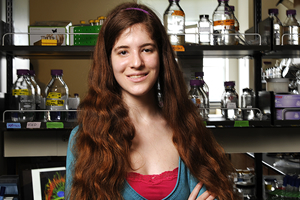Two College of New Jersey sophomores have been named Goldwater Scholars, the country’s most prestigious undergraduate award for students in mathematics, science and engineering. They are biology majors Syndi Barish and Andrew Goldfarb.
Two additional students were awarded honorable mentions, bringing TCNJ distinction. The honorable mentions went to Dylan McClung and Daniel Chawla, also biology majors. Universities are allowed to nominate only four students, and all four TCNJ nominees won honors in the competition.
Nationwide only 283 students were awarded Goldwater Scholarships. The one- and two-year merit scholarships cover educational costs up to $7,500 a year. But the award is best known for the recognition and status it confers. “Getting the award, or an honorable mention, tells us not only that these students will excel in grad school, but they have the potential to be real leaders in their fields,” says chemistry professor Michelle Bunagan, who shepherded students through the application process.

Barish got the news in a text message from a fellow student. “I couldn’t sleep all night, I was so happy,” says Barish, who is also majoring in applied mathematics and plans on earning a Ph.D. in genetics and researching genetic disorders. She’s worked in research labs since she was a junior in high school. “What’s really cool for me about doing research is that you get to figure out new things. You find out things no one else knows, and then you can use it to help,” she says. This summer she will work as a paid intern in a genetics lab at the Cold Spring Harbor Laboratory, the nonprofit research institution on Long Island.

Andrew Goldfarb is spending this semester working at a medical center in Leiden, the Netherlands, where he is researching genetic engineering techniques to treat CADASIL Syndrome, a hereditary stroke disorder. “My desire to perform full-time research, rather than the typical study abroad experience, led me here,” he wrote in an email. After college he plans on applying to an MD-Ph.D. program and hopes someday to design genetically based treatments to treat his own patients. Science has infatuated Goldfarb since childhood, but he got hooked on genetics at 14 when he and his twin brother took a DNA test to find out whether they were fraternal or identical twins. “We sent our cells to a lab. A few weeks later we got a letter saying there is a 99.9 percent chance we are identical.”
— Mary Jo Patterson
